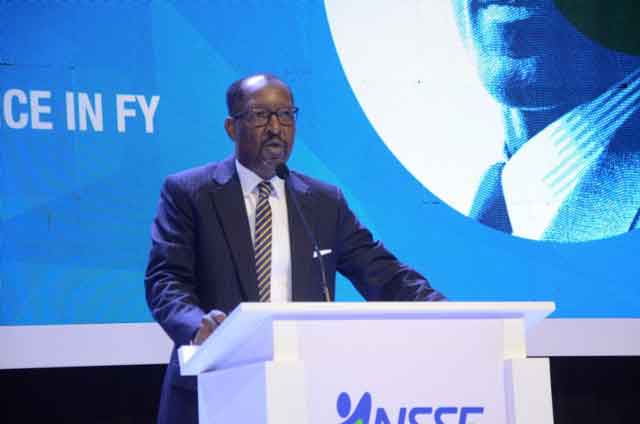
Kampala, Uganda | THE INDEPENDENT | Savers with the National Social Security Fund will get an additional 10.75 percent of the value of their total savings held as at July 2020 in form of annual interest.
This follows the surprise declaration of the interest rate for the year by the Minister for Finance, Planning and Economic Development Matia Kasaija Monday morning.
Earlier, the NSSF Managing Director, Richard Byarugaba had hinted that the interest rate for the year 2019/2020 would be less than 10 percent, following what he called a hard season. Analysts had predicted a 7% interest announcement, so Kasaija’s announcement of 10.75 came as a surprise to many.
The NSSF determines interest on the 10-year average inflation rate, on to which two percentage points are added to get the minimum rate to be offered.
The savings grew by just 5 percent, the lowest rate of growth in its history, to 1.28 trillion shillings.
Most of the fund’s investments, including savers’ contributions were affected by the global Covid 19 pandemic, which saw businesses struggle to remit workers’ savings.
The Fund allowed companies to defer remittances during the crisis for April, May and June as a way of supporting government’s interventions to combat the effects of the Pandemic. This means, it had to suspend collection of 22 billion shillings from companies that were deemed to be financially stressed.
The other areas affected were the investments both in Uganda and of the stock markets across the East African Community, as all the economies were almost equally affected.
According to the audited financial statements, Assets under Management increased by 17% from UGX 11.3 trillion to UGX 13.38 Trillion, as at end of June, 2020, mainly driven by increased contributions and interest income.
The pandemic also led to a cancellation of many planned activities by NSSF, and this led to a reduction the cost of administration.
Total Revenue increased by 17% over the year to 1.47 trillion shillings, driven by growth in interest income as a result of higher yields in fixed income investments like government treasury bills, as well as rental income.
However, income that the Fund earns as dividends from investments in listed companies, reduced by 19 percent to 62 billion shillings, especially after the Central Bank directed commercial banks not to pay dividends during the pandemic.
Companies, NSSF has shares in include Stanbic, DFCU, Baroda, Diamond Trust banks and NIC.
The fund also says the money paid in benefits to qualifying members increased by 8 percent to 486 billion during the year, one of the slowest growths ever, saying that when the country was in lockdown, a significant number of claimants opted to keep their savings safe, rather than withdraw them.
Interestingly, 3.2 percent of the members who have attained the age of 55 years to claim all their benefits and exit the fund are abstaining from collecting it. As a result, NSSF is holding 460 billion shillings for such members and they are going to earn an additional about 47 billion for staying remaining in the fund.
Announcing the rate, Minister Kasaija also responded to the ongoing calls for the amendment of the law to allow savers to be able to access their savings midway through their working life.
He says they are yet to agree with some MPs and workers’ leaders who are pushing for this:
Meanwhile, NSSF Managing Director, Richard Byarugaba wants the NSSF amendment bill before parliament expedited, specifically to utilize the clause that lowers the threshold for companies that should contribute the Fund, even if they have fewer than five employees.
The representatives of the workers expressed excitement that that the savers were able to get a 10 percent interest despite the economy being hit by the effects of Covid 19 pandemic.
Christopher Peter Werikhe, a board member representing the National Organisation of Trade Unions, NOTU is also upbeat that the Amendment Bill will soon be made into law to allow savers access their benefits before the retirement age as is the case today.
********
URN
 The Independent Uganda: You get the Truth we Pay the Price
The Independent Uganda: You get the Truth we Pay the Price





